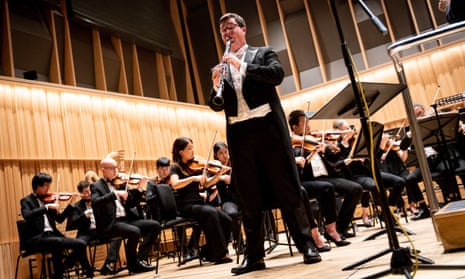Julian Lloyd Webber, the former virtuoso cellist, is to step down from his job as principal of Birmingham’s music conservatoire if a block on national funding for his institution is not lifted.
“I am not going to stay and watch all the things we have done going downhill. Why would I? You just can’t run a major institution in this hand-to-mouth way, from year to year,” he said this weekend, hoping his threat will prompt quick action and expose what he claims is a bias in favour of London-based music academies.
Lloyd Webber, who joined the Royal Birmingham Conservatoire (RBC) five years ago and has overseen the construction of a £57m academic building and concert hall, said his work there, establishing a leading centre for performance, composition and research, had reached a pitch of frustration. Without continued support from the Office for Students (OfS), the body in charge of higher education in England, Lloyd Webber believes he will be unable to keep attracting young musical talent from across the world, or continue Birmingham’s successful outreach programme.
“As a result of rules the OfS has come up with we are now being starved of resources,” Lloyd Webber told the Observer. “It is a shocking decision. We have been punished for being successful, as we have done everything that was asked of us and more.”
He said his conservatoire’s status as part of a wider university was now held against it. A specialist music centre grant from the government has been dropped and the RBC is now funded like an academic department.
“It is a major frustration because there is a sense that funding is being deliberately taken away. Yet the Guild Hall in London, which already gets funding from the City of London, is allowed to receive extra funding. A total of £16m goes out to the four major music schools in the capital.”

The Birmingham School of Music was founded in 1886 and it joined Birmingham City University in 1970, becoming a conservatoire in 1989 and merging with Birmingham School of Acting in 2017, when it gained royal status. “I’ve learned a lot about the London cultural bias since moving up to Birmingham, witnessing it for myself. But what do we do now? This is the point in the year where scholarships and grants need to be awarded to prospective students,” said the RBC’s principal.
Lloyd Webber, younger brother to Baron Lloyd Webber, the composer and impresario, fears he must now turn down students who have chosen Birmingham above other British music schools and who will otherwise go to America. “We have worked very hard to get into the position where we are first choice and it is something that benefits the whole of British culture,” he said. He cited the case of Lily, a “brilliant” 17-year-old Australian cellist. One of five or six foreign students who have applied only to RBC, she will otherwise go to the Julliard School in New York. As a result of financial problems, she now sees studying in Birmingham as “an unachievable dream”.
A spokesman told the Observer that the OfS, formerly known as the Higher Education Funding Council for England (HEFCE), is to review any “exceptional funding” it allocated this year as part of a wider review and added that it recognised the importance of supporting specialist institutions within funding constraints.
“As part of Birmingham City University, the RBC is not eligible for direct funding from the OfS,” he said. “However, the OfS has continued the HEFCE’s previous decision to exceptionally fund music provision at Birmingham City University at the same rate as laboratory-based science. In addition, the university was allocated £8m in 2016 to provide digital infrastructure at the RBC.”
Lloyd Webber argues the RBC is more than a university department. It offers 35 hours a week of one-to-one tuition, conducts research and runs a junior school. He believes a lack of OfS funding will restrict projects involving more than 4,500 children across the West Midlands. Lloyd Webber, who previously set up south London’s acclaimed In Harmony programme for providing teaching to children without financial privilege, believes this puts children outside London at a disadvantage.
“A parent of one of thousands of young people who would have no other access to music training wrote to me recently to say their son had developed as a person, as well as a musician. The letter read, ‘It’s just beautiful how it’s opened so many doors for him and how he has made so many new friendships’,” said Lloyd Webber.
Other British funding boards, such as the Associated Board of the Royal Schools of Music (ABRSM), also focus their grants on academies and conservatoires outside the West Midlands area.
